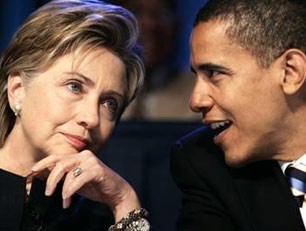WASHINGTON (AP) -- The 2008 presidential race began so early that voters have been on a first-name basis for months with Hillary and Barack, Rudy, Mitt and the other contenders. Yet people seem no closer to choosing from among them.
Democrats are hopeful of reclaiming the White House, helped by President Bush's unpopularity, general unhappiness with the Iraq war and fears about the worsening housing and credit crunches. Those issues will be waiting for whoever succeeds him.
If dollars are any indication, the Democrats have generated more enthusiasm, pulling in about 50 percent more money than the Republican presidential candidates. Hillary Rodham Clinton, Barack Obama, John Edwards and the other Democrats had raised $225.3 million to the Republicans' $149 million, as of Sept. 30.
In national polling, New York Sen. Clinton held a big lead throughout the year and was seen as the candidate to beat. Former New York Mayor Rudy Giuliani dominated the Republican field; his closest competitor, Arizona Sen. John McCain, plunged in the polls after spending too much money and losing several top aides. McCain righted his campaign and slowly began to climb. Actor-politician Fred Thompson was supposed to invigorate the GOP, but his entry into the race was late and lackluster. Former Massachusetts Gov. Mitt Romney crept up steadily and led in early-voting states until Mike Huckabee, a Baptist preacher and conservative favorite, threatened to win Iowa.
The year ended as it began, with national leads for Clinton and Giuliani despite arguments that the former first lady is too polarizing and he is too liberal for his party.
Even so, the nomination races were far from settled where it really counts, in states where the nomination battles will be waged.
Why so chaotic? Two reasons, said David Rohde, political science professor at Duke University. There is no president or vice president running - for the first time in half a century - and people don't necessarily like their choices for new leaders.
"The main reason is that each of the candidates has some significant weakness," Rohde said. "This is more than not perfect. These are serious deficits."
Among Democrats, voters worry that if Clinton wins the nomination she might not win the general election, that Illinois Sen. Obama lacks experience and that former North Carolina Sen. Edwards isn't much different from when he and John Kerry ran and lost four years ago, Rohde said.
Among Republicans, voters are uncomfortable with Giuliani's left-leaning positions as New York mayor on abortion and other social issues. They're also concerned about Romney's flexible stances and his Mormonism, about McCain's independent inclinations and Thompson's muted campaigning, he said.
After nearly a year of presidential politicking, voters in Iowa and New Hampshire are divided among the leading candidates, and more than half are still undecided, according to CBS/New York Times polls in the two states.
That makes the race up for grabs in the states voting in the opening weeks of 2008.
Among Democrats, Clinton is essentially tied with Obama and Edwards in Iowa, which begins the voting with caucuses on Jan. 3. Her rivals view Iowa as the one place they might block Clinton.
Clinton is targeting women who are new to the Iowa caucuses, while Obama is courting young voters and Edwards is working to turn out traditional caucus attendees, especially those in rural areas. Clinton has a comfortable lead in New Hampshire, which votes on Jan. 8, and the former first lady has millions of dollars to compete in the states that come next.
As for Republicans, Romney hopes victories in Iowa and New Hampshire will clear a path for him in the later states though Huckabee had seized the edge in Iowa. Giuliani aims to win in bigger, later-voting states such as Florida on Jan. 29 and California, New York and Illinois on Feb. 5, but he still is taking on Romney in New Hampshire, where he recently began running his first TV ads of the campaign.
Thompson hopes to win on Jan. 19 in South Carolina, where he runs close to Giuliani and Romney in polls. McCain could do well in New Hampshire.
Potential spoilers lurk in Ron Paul, an underdog GOP Texas congressman who managed to raise more than $4 million in one day, and in New York Mayor Michael Bloomberg, a billionaire who could launch an independent bid next year.
On the issues, Democrats have been arguing lately about health care; Clinton and Edwards offer universal plans requiring everyone to have insurance, while Obama opposes such a requirement.
Immigration has become a dominant issue for Republicans: Many voters tell pollsters it's No. 1. Romney and Thompson are running ads that call for secure borders and denounce amnesty for illegal immigrants. Giuliani, who as mayor advocated some pro-immigrant policies, is calling for a "virtual" fence with high-tech monitoring to stop illegal immigration; his ads have focused on his crime-fighting and tax-cutting in New York.
© 2007 The Associated Press. All rights reserved. This material may not be published, broadcast, rewritten or redistributed. Learn more about our Privacy Policy.
Wednesday
April 24th, 2024
11:20AM









